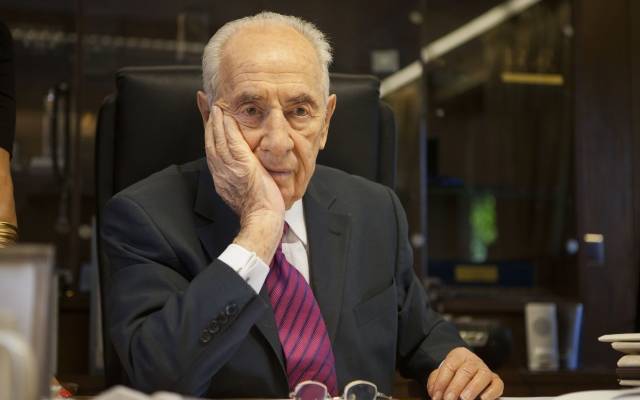Shimon Peres’ death on Wednesday was mostly greeted with official silence across the Arab world — in sharp contrast to the emotional tributes that poured in from the rest of the world.
Israel’s Shimon Peres was widely admired around the world as a peacemaker and visionary, but the view in the Arab world was more complex: Memories linger of another Peres, who built up Israel’s military might, waged war in Lebanon and promoted policies seen as harmful to the Palestinians.
While a long list of world-class dignitaries prepared to descend upon Jerusalem for Peres’ funeral on Friday, no Arab leaders are yet scheduled to come. Even Egypt and Jordan, the two countries that have peace accords with Israel, had no official reaction Wednesday.
But there was some positive reaction from the Arab world.
As reported on i24 news, Bahrain’s foreign minister paid tribute to Israel’s former president Shimon Peres on Thursday, in a surprise statement that drew strong Arab criticism on social media.
“Rest in Peace President Shimon Peres, a Man of War and a Man of the still elusive Peace in the Middle East,” Sheikh Khaled bin Ahmed al-Khalifa said on Twitter.
The response to his tweet was swift.
Like most Arab countries, Bahrain does not have official diplomatic relations with Israel, and many Arabs associate Peres with the successive wars that have rocked the Middle East rather than the Oslo accords with the Palestinians that earned him the Nobel Peace Prize.
“The foreign minister is paying tribute and praying for the Zionist terrorist and the killer of children,” complained former opposition lawmaker Jalal Fairooz.
Arad Nir, the foreign affairs commentator for Channel 2 TV, said it would be “very sad” if the people who Peres negotiated with did not attend the funeral. “It puts a question mark on Shimon Peres’ vision, his life’s mission: Peace,” he said.
The silence reflects the animosity toward Israel in the Arab world, particularly at a time when the peace process Peres helped launch has collapsed. The Israeli-Palestinian issue is not high on the region’s agenda these days, amid other wars and crises, noted Michael W. Hanna, a Middle East expert at the New York-based Century Foundation.
“Besides, Peres left behind a complicated legacy,” he said.
Peres gained worldwide fame — and a Nobel Peace Prize — as the architect of the historic Oslo interim peace accords with the Palestinians in the mid-1990s. Late in life, he established a “peace center” in Tel Aviv that promoted coexistence between Israelis and Palestinians, and as the nation’s president he used the global stage to call for peace.
But in the Arab world, especially among Palestinians, many saw Peres’ vision of peace as all talk.
“He often presented himself as a man of peace, but no one in the Arab world really believed him,” said Abdullah el-Sennawy, a prominent Egyptian columnist. “Whenever there was war, he was there.”
Palestinians Blame Peres for Woes
As one of Israel’s founding fathers, Peres was associated with the so-called “naqba,” or catastrophe, that supposedly befell the Palestinians in the 1948 war when many fled or were forced from their homes.
“Peres was a significant contributor to the historic injustice that occurred to the Palestinian people,” Ghassan Khatib, a former Palestinian government spokesman, wrote on his Facebook page.
As a Defense Ministry official during the 1950s, he helped turn Israel into a regional military power and played a central role in secretly developing what is widely believed to be a sizable nuclear arsenal. And after Israel returned to Judea and Samaria and unified Jerusalem in the 1967 Mideast war, Peres was an early defender of efforts to build Jewish communities there – a position he would later abandon.
‘The Butcher of Qana’
Under Peres in 1996, an Israeli military operation in Lebanon included a deadly artillery strike on a UN compound in the village of Qana that killed dozens of civilians who had fled fighting to take refuge there.
The incident is a key part of Peres’ legacy across the region. Announcing Peres’ death on Wednesday, Iran’s state television called him “the butcher of Qana.”
“He will stand in front of God and defend himself for his heinous crimes against humanity,” said Hamad al-Qahtani, a Kuwaiti government employee. “He killed refugees, orphaned children and destroyed families. May he get what he deserves.”
More recently, during his presidency, Peres defended Israeli offensives against Hamas in Gaza in 2009, 2012 and 2014.
In one famous encounter at the 2009 World Economic Forum in Davos, Peres clashed with Turkey’s then-prime minister, Recep Tayyip Erdogan, about the Israeli offensive in Gaza. “You kill people,” Erdogan said, rejecting Peres’ argument that the invasion was an act of self-defense because Hamas had launched rockets at Israel.
In Gaza on Wednesday, Hamas expressed joy over Peres’ death, and in Iran, local media reported that students distributed candies at Imam Sadegh University to celebrate.
“Shimon Peres was an example of how the world can forget someone’s crimes if they only live long enough,” Sultan Saoud al-Qassemi, a popular commentator in the United Arab Emirates, wrote on his Twitter feed.
Not all the reaction in the Arab world was negative. Palestinian Authority (PA) head Mahmoud Abbas, a negotiator in the Oslo process, expressed “sorrow and sadness” over Peres’ passing. Officials said Abbas was considering attending the funeral on Friday.
And in Iraq, Iyad Jamal al-Din, a Shiite cleric and former politician, praised Peres as a “wise leader who helped his people.”
“What have Arab leaders done for their people? Peres turned Israel from a militia to a state. Today, the last wise man of the Israelis has passed,” he said.
Iranian political analyst Hassan Hanizadeh said Peres had been a moderating force in the region and helped prevent conflict. Netanyahu and other hard-liners will now have “a more free hand in implementing their hard-line policies in the region and world,” he said.
By: AP










